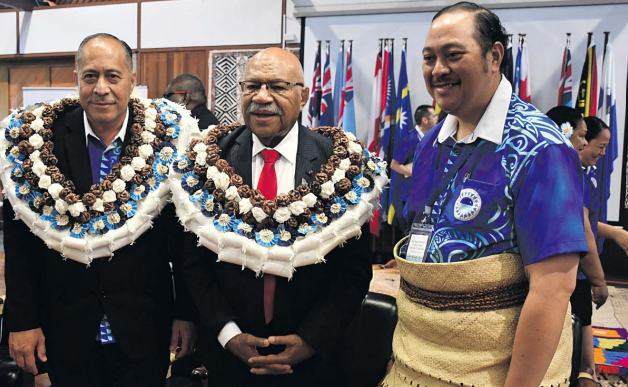The timing was stark. As Prime Minister Sitiveni Rabuka delivered his powerful warning at the Pacific Regional and National Security Conference on Monday, painting a picture of a “Blue Pacific” exploited, threatened, and facing a “polycrisis” of climate chaos, eroding order, and transnational crime, a parallel crisis was exploding within Fiji’s own borders. The following day, Police Minister Ioane Naivalurua, with commendable urgency but troubling insularity, declared Fiji’s spiraling drug crisis a “national emergency”. Mr Naivalurua is right about the scale: 4.1 tonnes of seized methamphetamine is a terrifying monument to the cartels targeting our islands. His call for a “national security consciousness,” a “generational movement” involving every level of society, is vital. But his framing – solely as a Fijian emergency – represents a critical, perhaps dangerous, missed opportunity. It underscores the very gap between rhetoric and regional action that Mr Rabuka himself must urgently bridge.
The missed synergy: From Suva’s podium to regional reality
IMAGINE the impact if Mr Naivalurua had stood alongside Mr Rabuka’s regional security call. Imagine declaring Fiji’s emergency not in isolation, but as the latest, brutal evidence validating Mr Rabuka’s diagnosis: transnational criminals are actively exploiting the vulnerabilities of the Blue Pacific. The record meth haul isn’t just a Fijian problem; it’s a flashing red siren illuminating a regional trafficking superhighway. These syndicates operate across our porous maritime borders, leveraging weak surveillance, corruption, and the vastness Mr Rabuka lamented was treated as a “theatre for external wars”. They are the insidious “external war” being waged within our region.
Rabuka’s polycrisis demands a poly-solution – centred on PIF
Mr Rabuka spoke powerfully of climate change, strategic competition, and transnational crime as interconnected threats. The drug crisis is that nexus in action:
1. Maritime vulnerability: Traffickers exploit the same vast, poorly monitored ocean spaces where illegal fishing plunders resources and climate change stretches coastguard resources thin.
2. Corrosive governance: Drug money fuels corruption, directly undermining the “rules-based order” and national sovereignty Rabuka champions.
3. Societal fragmentation: As Mr Naivalurua stated, drugs “undermine our social fabric.” This fragmentation weakens collective regional resilience precisely when unity is paramount.
4. Geostrategic leverage: Criminal networks can become tools or pressure points for external powers engaged in the “strategic competition” playing out on our doorstep. Declaring it solely a national emergency ignores this web. It perpetuates the fragmented response that leaves every island nation fighting a hydra-headed beast alone. What Mr Rabuka labelled a “polycrisis” demands a poly-regional response.
The Pacific Islands Forum: The only viable command centre
This is where Mr Rabuka must move decisively from powerful speech to powerful PIF-centric strategy. His call for the Pasifika to “stand together, united in our values, clear in our vision, and firm in our resolve” finds its ultimate test in confronting the transnational drug scourge. Fiji, as he asserted, has a “particular responsibility”. That responsibility now means:
1. Elevating the Emergency to the PIF agenda: Mr Rabuka must personally champion a regional declaration recognising the cross-border drug crisis as a fundamental threat to Blue Pacific security, alongside climate change. Fiji’s national emergency is the catalyst.
2. Championing concrete PIF mechanisms: Advocate fiercely within the Forum for:
l Enhanced joint maritime surveillance: Integrating resources (air, sea, intelligence) under a PIF-co-ordinated framework targeting trafficking routes.
l Regional intelligence fusion centre: A dedicated PIF facility for real-time sharing of criminal intelligence, building on nascent efforts but with greater mandate and resources.
l Harmonised legal frameworks and prosecution: Working towards common legal standards and extradition treaties to prevent criminals exploiting jurisdictional gaps.
l Co-ordinated demand reduction: Sharing best practices for prevention, treatment, and community resilience programs across member states.
3. Leveraging Fiji’s new bureau regionally: Fiji’s $1.9m Counter Narcotics Bureau must be designed from inception to plug into and strengthen the regional network, not operate as a silo.
4. Speaking with one voice to external partners: The PIF bloc, led by Fiji, must demand targeted support (technology, training, capacity building) from international partners to combat trafficking networks, framing it as essential for regional stability and sovereignty — core to Mr Rabuka’s vision.
The litmus test of leadership
Mr Naivalurua warned that Fiji must not become a “narcotics playground”. The far greater danger is the entire Blue Pasifika, becoming a playground for criminal cartels. Mr Rabuka’s powerful words in Suva laid bare the threats. Fiji’s devastating drug bust screams the immediacy of one facet of that polycrisis.
The declaration of a national emergency was necessary, but insufficient. The true test of Mr Rabuka’s regional leadership begins now. Will he seize Fiji’s crisis as the catalyst to mobilise the Pacific Islands Forum into a unified front against the transnational criminals exploiting our shared ocean and vulnerabilities? Will he transform the call for regional unity into concrete, PIF-driven action against a threat that scoffs at national borders?
The people of Fiji, and the entire Blue Pasifika, need their leaders to see beyond the horizon of their own shores. The narcotics test is not just Fiji’s; it is the Pasifika’s. Passing it requires Mr Rabuka to lead, decisively and collaboratively, through the only forum that can match the scale of the threat: the Pacific Islands Forum. The time for insular emergencies is over; the era of collective Pasifika security must begin.



